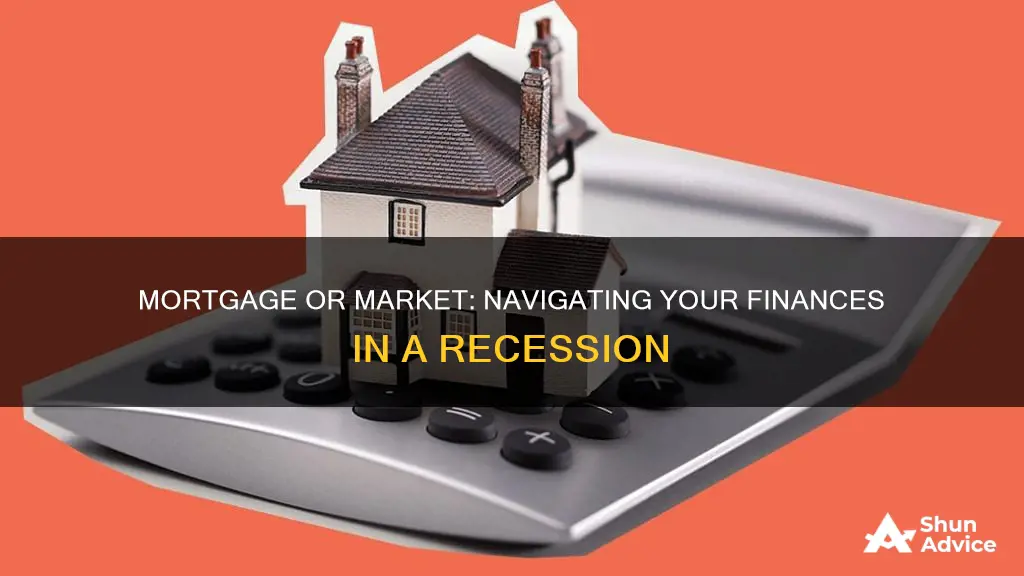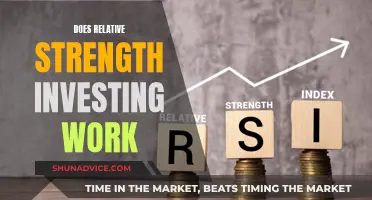
Paying off your mortgage or investing in a recession is a complex decision that depends on various factors, including your financial situation, risk tolerance, and economic conditions. Here's an introduction to the topic to guide your exploration:
The decision to pay off your mortgage or invest during a recession hinges on several key factors. Firstly, it's essential to understand the concept of good debt. Mortgages are generally considered good debt because they are tied to an asset, your home, which typically appreciates over time. This makes it a relatively low-risk investment with a lower interest rate compared to other loans. As a result, some financial advisors advocate leveraging your mortgage instead of rushing to pay it off. On the other hand, paying off your mortgage early can provide peace of mind, especially if you're averse to debt. It eliminates a significant monthly expense and can boost your credit score. However, it's important to remember that you'll be tying up your cash in an illiquid asset, and the housing market may not always provide the highest returns compared to other investments.
During a recession, the decision becomes even more nuanced. Financial experts typically recommend clearing high-interest debt, such as credit card balances, but the advice on low-interest loans like mortgages is less clear-cut. Paying off your mortgage early can provide financial stability and reduce stress, especially if you're concerned about job loss or income reduction during the recession. However, it's crucial to weigh this against the opportunity cost of investing your money elsewhere for potentially higher returns. The stock market, for example, has historically returned an average of about 10%, which could outweigh the benefits of paying off your mortgage early.
Ultimately, the decision comes down to your personal financial situation and risk tolerance. If you have sufficient emergency savings, are on track with your retirement goals, and have a low-interest mortgage rate, investing your money may be a more lucrative option. However, if you prioritize debt repayment and value the security of owning your home debt-free, paying off your mortgage early might be the right choice for you.
| Characteristics | Values |
|---|---|
| Pros of paying off mortgage | No monthly payments |
| Peace of mind | |
| Build equity | |
| Cons of paying off mortgage | Loss of liquidity |
| Loss of tax breaks | |
| Pros of investing | Higher returns |
| Liquid investment | |
| Employer match | |
| Cons of investing | Higher risk |
| Increased debt |
What You'll Learn

Paying off your mortgage early can reduce interest costs
Once you've received the necessary documents, it's important to update your insurance and taxes. If you had an escrow account, it will be closed, and any remaining funds will be returned to you. From now on, you'll be responsible for paying your home insurance and property taxes directly. It's also a good idea to notify your insurance provider and any local authorities that you are now the sole owner of the property.
With your extra funds, you can now maximize your retirement savings, pay off other debts, expand your emergency fund, work towards other savings goals, or start investing. For example, you could use the money to boost your 401(k) or IRA, pay off credit card balances or personal loans, or invest in stocks, bonds, or mutual funds.
Finally, monitor your credit to ensure that your mortgage has been reported as paid in full and closed with a zero balance. While your credit scores may initially decline slightly, the account and its on-time payment history will continue to benefit your credit scores for up to 10 years.
Dividend ETFs: Smart Investment for Young People?
You may want to see also

Investing can provide higher returns than paying off a mortgage
If you have spare cash and are deciding between paying off your mortgage or investing it, it's important to consider the potential benefits of both options. While being debt-free is an admirable goal, investing may provide higher returns and be a better financial decision.
One of the main advantages of investing is the potential for higher returns. Historically, the stock market has offered higher average returns than mortgage interest rates. This means that by investing in stocks, you may be able to earn more money than you would save by paying off your mortgage early.
Another benefit of investing is liquidity. Investments such as stocks, bonds, and mutual funds are typically more liquid than money invested in your house. This means that if you need cash quickly, it is easier to sell your investments than to sell your home or take out a second mortgage.
Additionally, if you invest in a retirement account, you may be able to take advantage of employer matching contributions, which is essentially free money. You can also benefit from tax breaks on retirement account contributions.
However, it's important to consider the risks associated with investing. The stock market is volatile, and there is always the potential to lose money. Investing also does not eliminate your debt, and you will still need to make your mortgage payments.
When deciding between paying off your mortgage or investing, it's crucial to consider your financial goals, risk tolerance, and mortgage rate. If you have a low mortgage rate, investing may be the better option as you can potentially earn a higher rate of return. On the other hand, if you have a high mortgage rate, you may want to prioritise paying off your mortgage to save on interest.
Ultimately, the decision to pay off your mortgage or invest depends on your financial situation and risk tolerance. Consult a financial advisor to help you assess your finances and make the best decision for your goals.
School Loan vs. Investment Loan: Which Debt Should You Tackle First?
You may want to see also

Paying off a mortgage can give peace of mind
Paying Off Your Mortgage Can Give Peace of Mind
Paying off your mortgage ahead of schedule can be a good idea if you are someone who is debt-averse and wants to rid yourself of the constant burden of debt. It can also be a good idea if you are nearing retirement and want to reduce your monthly expenses.
Pros of Paying Off Your Mortgage
- You will no longer have to worry about monthly mortgage payments, which can reduce stress and provide peace of mind.
- You will have more cash flow each month, as you will no longer have a large mortgage payment.
- Your credit score may increase as you pay down your debt.
- You won't have to worry about losing your home to foreclosure if you experience financial difficulties.
- You will build equity in your home faster, which can be beneficial if you need to sell your home or take out a home equity loan.
Cons of Paying Off Your Mortgage
- You will lose liquidity if you use all your savings to pay off the mortgage.
- You may lose out on the opportunity to invest your money in the stock market or other investments, which could provide higher returns.
- Your interest rate on your home may be low, and it may be hard to reproduce this rate if you buy another home.
- Most recessions are mild, and you may regret using all your cash reserves to pay off your home.
- You will lose the ability to take the mortgage interest deduction on your taxes.
Factors to Consider
When deciding whether to pay off your mortgage or invest, consider the following:
- Do you have sufficient emergency savings?
- Are you putting away enough for retirement?
- How much other debt do you have?
- What are your prospects for increasing your income?
- What are your financial goals for the short and long term?
- How does your mortgage rate compare to expected investment returns?
Ultimately, the decision to pay off your mortgage or invest depends on your financial situation, risk tolerance, and personal preferences. Consult a financial advisor to get personalized advice for your specific circumstances.
Local Superfund Sites: Worthy Investment Opportunities
You may want to see also

Paying off a mortgage may restrict liquidity
Liquidity refers to the ease with which you can access and use your money. For example, cash is considered a liquid asset because it is easy to convert into other assets or use for transactions. In contrast, property is an illiquid asset because it cannot be quickly or easily converted into cash.
When you pay off your mortgage in full, you may lose liquidity because all your savings are now tied up in your home. This could be detrimental during a recession when cash is king. Here are some reasons why preserving liquidity is crucial during an economic downturn:
You Need Cash to Cover Expenses During a Recession
During a recession, you may face reduced income or job loss. Having cash on hand is essential to cover your living expenses, such as groceries, utilities, and other bills. If your savings are tied up in your home, you may struggle to meet these basic needs.
You May Need to Tap into Your Emergency Funds
Recessions can bring unexpected expenses, such as car repairs or medical bills. If you've paid off your mortgage, you've reduced your overall debt but lost the flexibility to access cash quickly in an emergency.
You May Need to Relocate for Work
In some cases, a recession may force you to relocate to find employment or improve your financial situation. If your wealth is tied up in your home, it may take longer to sell your property and access the funds needed for relocation.
Investing Opportunities May Arise
During a recession, stock prices tend to fall, creating buying opportunities for investors. If you've paid off your mortgage, you may miss out on these investment opportunities since your money is tied up in your home.
You May Need to Refinance Your Mortgage
If you've already paid off your mortgage, you won't have the option to refinance and take advantage of lower interest rates. Refinancing can help reduce your monthly payments and free up cash flow, which is crucial during a recession.
In conclusion, while paying off your mortgage may seem appealing, it's important to consider the potential impact on your liquidity. Preserving liquidity during a recession can provide you with financial flexibility and help you navigate economic challenges more effectively.
Investing: Nice People Turn Nasty
You may want to see also

Recasting your mortgage can be an alternative to paying it off
Recasting your mortgage can be a good alternative to paying it off early. It is a form of prepayment where you make a lump-sum payment towards the principal balance of your loan. The lender will then reamortize your mortgage with the new, lower balance, resulting in lower monthly payments. Your interest rate and loan term remain the same.
Recasting your mortgage can be a good option if you want to lower your monthly payments without refinancing. Unlike refinancing, recasting does not require you to apply for a new loan, and the fees are typically lower. It can also be a good option if you want to keep your current interest rate, as refinancing usually means accepting the current market rate.
However, there are some things to keep in mind. Not all lenders offer mortgage recasting, and not all types of mortgages are eligible. For example, government-backed loans such as FHA, VA, and USDA loans generally do not qualify for recasting. There may also be minimum principal reduction requirements, and you will need to be in good standing with your payments. Additionally, recasting your mortgage will not shorten the term of your loan.
Overall, recasting your mortgage can be a good alternative to paying it off early if you want to lower your monthly payments without refinancing or changing your interest rate. However, it is important to consider the eligibility requirements and potential fees before making a decision.
Smart Ways to Invest $50,000
You may want to see also
Frequently asked questions
Paying off your mortgage early has the following pros:
- You'll no longer have to worry about monthly payments.
- You'll save money on interest.
- You'll build equity in your home faster.
- You'll have peace of mind.
However, there are also cons to consider:
- You'll lose liquidity if you use all your savings to pay off the mortgage.
- You may lose out on tax breaks.
- Your money won't be compounding in interest-bearing accounts.
Investing instead of paying off your mortgage early has the following pros:
- You'll benefit from higher returns on average.
- Your money will be in liquid assets, which are easier to sell and access.
- You may get tax breaks and employer matches with certain investments.
But there are also cons:
- There's more risk involved with investing.
- You'll still have to make mortgage payments.
- You may be sacrificing an opportunity to build wealth through home equity.
Here are some key questions to ask yourself when deciding whether to invest or pay off your mortgage:
- Do I have sufficient emergency savings?
- Am I putting away enough for retirement?
- How much other debt do I carry?
- What are my prospects for increasing my income?
- What are my short-term and long-term financial goals?
- How does my mortgage rate compare to expected investment returns?







